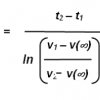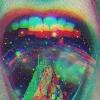The "wave pattern" is just a general observation.
The wave is caused electrical-chemical firing rates of neurones that are different for serotonergic, dopaminergic, noradrenergic, cholinergic, opioidergic, glutamatergic and other types of neurones as well. Subtypes of these also have different firing rates but for example dopaminergic (action) are usually a lot faster than serotonergic (state) as they need to modulate actions in real life meaning modulating moving hands by tracking distance to goal position every 1/10th of a second for example.
I beleive these main networks provide typical "alpha", "beta" etc brain waves. Neuron pathways mostly run parallel to each other from one brain region to the other in bundles. Neurons of a single type from a single region fire in synchrony causing an observation of wave like phenomena along those pathways.
There is a small part of the brain that actually has all the "experience of all senses" go through it, forgot what it's called, it's a small spot on the right back side somewhere. I wish I could remember, I think it was a part of anterior cingulate or something. But it's just a converging point, it is not a brain part for consciousness.
Consciousness is supported by a complex mechanism of regions that do a specific task. It is not supported by an amorphous mass of neurones.
Consciousness as in ability to respond to surroundings arises very early. But as "newer"(evolutionary and developmentaly) brain parts grow during maturation, consciousness is increasingly wired to more and more senses and internal models(brain parts keeping a functional internal representation of outside objects) and simply gets fed more "types of data". The process is seamless as a person matures. For example the vmPFC is the last brain part to evolve providing "wisdom" as explained somewhere. Wisdom is a sense of being an object in a context that "works" that object (being a policeman on the street, being a parent on parents council, being a teach on parents council). That means detecting that a context has caused you to become an object of that context and the experience of being such an object was related to being other objects in history and concluded that this new object role is not beneficial. Now, notice that kids have quite an issue around detecting what object they are in a context. As they grow up their brain, if properly nurtured will increasingly begin to recognize assigned or engulfed object roles within contexts and will learn to avoid or aproach those object-contexts that they enjoy. As this starts to happen kids will increasingly "practice" this new brain part by playing practical jokes on each other (making the other person an object of a negative context in some way, placing them in awkward situations, leading them on etc). Parallel to that modern kids also start objectifying themselves into narcissistic "monsters" in order to avoid "shaming by context"(school-coolness) causing an overdevelopment of consciousness(being a successfull object of a context, being a cool guy in a cool-demanding crowd) and underdevelopment of "awareness" or vmPFC (awareness of objectifying contexts) causing an inability to perceive the context as unhealthy (refuse to care aboud cool-demanding crowd).
The development of these brain parts is controlled by success and failures of these "practices"(practical jokes etc) and also real experiences during maturing.
Success and failure causes opioid release which directly controls neuron progenitor stem cells to proliferate(success - enjoying - mu opioid - heroin) or differentiate(failure - learning - kappa opioid - saliva divinorum).
Edited by addx, 06 June 2014 - 04:10 PM.

















































